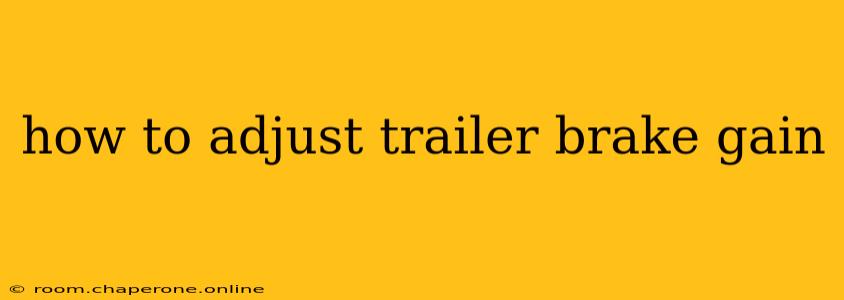Maintaining proper trailer brake gain is crucial for safe and efficient towing. Incorrectly adjusted brakes can lead to dangerous situations, including jackknifing or brake failure. This comprehensive guide will walk you through understanding trailer brake gain, identifying the need for adjustment, and safely performing the adjustment process.
Understanding Trailer Brake Gain
Trailer brake gain refers to the proportional amount of braking force applied to the trailer compared to the braking force applied to the towing vehicle. Essentially, it's how hard the trailer brakes will engage relative to your truck's brakes. Too little gain, and the trailer will push the tow vehicle; too much gain, and the trailer will lock up, potentially causing a jackknife. The ideal gain allows for smooth, controlled braking in all conditions.
Factors Affecting Trailer Brake Gain
Several factors influence the necessary trailer brake gain:
- Trailer weight: Heavier trailers require more braking force.
- Grade: Steeper inclines demand increased braking power to prevent runaway trailers.
- Road conditions: Slippery roads necessitate reduced gain to prevent wheel lockup.
- Trailer type: Different trailer designs and configurations might necessitate adjustments.
- Brake controller type: The type of brake controller (proportional, inertia, or electric) significantly impacts adjustment procedures.
Identifying the Need for Trailer Brake Gain Adjustment
Several signs indicate the need for adjustment:
- Trailer pushing the tow vehicle: This usually points to insufficient brake gain. The trailer brakes aren't engaging enough, causing the trailer to overrun the tow vehicle during braking.
- Trailer brakes locking up: Excessive gain is indicated when the trailer brakes lock up, causing the trailer to skid or jackknife. This is particularly dangerous.
- Uneven braking: If the trailer brakes engage unevenly, or only some wheels lock up, it suggests an issue with either the brakes themselves or the brake gain adjustment.
- Trailer sway: While not directly related to brake gain, excessive sway can be exacerbated by improper gain settings.
Adjusting Trailer Brake Gain: A Step-by-Step Process
The specific steps vary depending on your brake controller type. This section provides general guidelines. Always consult your brake controller's manual for precise instructions. Failure to do so could lead to damage or injury.
Safety First: Always perform adjustments on a safe, level surface away from traffic. Ensure the parking brake is engaged and the vehicle is secured before beginning any adjustments.
General Steps (Adapt to your specific brake controller):
- Find the Gain Control: Locate the gain adjustment knob or dial on your brake controller. It's usually clearly labeled.
- Start with a Low Setting: Begin with the gain set to a low level.
- Perform a Test Stop: Drive at a moderate speed (around 15-20 mph) and perform a controlled braking maneuver. Observe the trailer's response.
- Adjust Gradually: If the trailer pushes, increase the gain slightly and repeat the test stop. If the trailer locks up, decrease the gain.
- Iterate: Repeat steps 3 and 4 until you find the optimal setting that allows for smooth, controlled braking without locking up the wheels.
- Different Conditions: Test your brake gain on various grades and road surfaces to fine-tune the adjustment.
Types of Brake Controllers and Adjustment Techniques
Different brake controllers have varying adjustment methods:
- Proportional Brake Controllers: These offer precise control through a dial or knob for fine adjustments.
- Inertia Brake Controllers: These respond to changes in deceleration. Adjustments might involve calibration procedures rather than direct gain settings.
- Electric Over Hydraulic (EOH) Brake Controllers: These often involve more complex setup and adjustments often requiring professional assistance.
When to Seek Professional Help
If you're uncomfortable adjusting your trailer brake gain or experience persistent problems despite attempting adjustments, consult a qualified mechanic or trailer specialist. Incorrect adjustments can lead to accidents, so prioritize safety.
This guide provides general information. Always refer to your vehicle and brake controller manuals for specific instructions and safety precautions. Safe towing requires careful attention to detail and regular maintenance.

